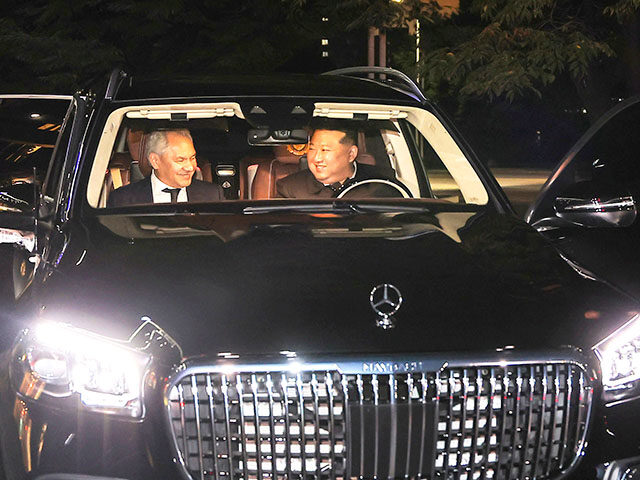Russian Security Council Secretary Sergei Shoigu met with Iranian President Masoud Pezeshkian in Tehran on Tuesday to reportedly discuss “continuous and lasting” cooperation, days after Shoigu made a similar stop in North Korea.
Shoigu, the former defense minister now transferred to serve strongman Vladimir Putin in security capacity, is among the most beloved Russian officials in Pyongyang. Shoigu and his delegation became the first foreign officials allowed in North Korea since the onset of the Wuhan coronavirus pandemic in 2023, regaled with a tour of some of North Korea’s most advanced weaponry. The visit, in July of that year, was pivotal for Shoigu’s career as Russia had just thwarted an apparent failed coup by Wagner paramilitary chief Yevgeny Prigozhin, who insisted he was not interested in overthrowing Putin but ousting Shoigu.
Now working in a less high-profile role, Shoigu made stops to meet the leaders of two of the world’s most anti-American regimes, clearly seeking to bolster geopolitical support.
In Tehran on Tuesday, Pezeshkian – a self-described “moderate” who assumed power after a special election in July – assured Shoigu that his administration was eager to expand ties to Russia. His administration “will seriously pursue the ongoing cooperation and efforts aimed at enhancing the level of relations between the two countries,” the president said, according to the Iranian state propaganda outlet PressTV.
PressTV noted that high on the agenda of discussion was the upcoming October BRICS summit in Kazan, Russia. BRICS – originally named after members Brazil, Russia, India, China, and South Africa – officially accepted Iran as a member in January. Ethiopia, Egypt, and the United Arab Emirates also became members this year, while Saudi Arabia claimed to have accepted an invite to join but reportedly never finalized its presence in the anti-American bloc.
Shoigu reportedly relayed enthusiasm on Putin’s part to welcome the new Iranian president.
“Mr. Putin is eagerly looking forward to meeting with you on the sidelines of the BRICS summit in Kazan, Russia,” Shoigu was quoted as saying.
Reuters, quoting other Iranian media, stated that Pezeshkian said he was interested in expanding Russia-Iran ties in “a continuous and lasting way.”
The visit appeared similar in form to Shoigu’s stop in Pyongyang on Friday, though North Korea is not a BRICS member. On that occasion, Shoigu met communist dictator Kim Jong-un to discuss “steadily deepening the strategic dialogue between the two countries,” the North Korean flagship media outlet, the Korean Central News Agency (KCNA), claimed.
Kim also addressed “strengthening cooperation to defend the mutual security interests” specifically and, generally, the “international situation.”
“At the talk, there was a wide exchange of views on the issues of Kim Jong Un affirmed that the DPRK [North Korean] government would further expand cooperation,” KCNA continued, “and collaboration with the Russian Federation in the spirit of the Treaty on Comprehensive Strategic Partnership in the future, too.”
The Comprehensive Strategic Partnership Treaty is an agreement Putin signed during a visit to Pyongyang – his first in two decades – in June. The document requires both countries to defend the other in the event of an attack, a mutual defense provision that alarmed international experts, who suggested that Russia may use the agreement to entangle North Korea in its ongoing invasion of Ukraine, or may result in Russian forces clashing with South Korea.
Some international observers, including multiple Western governments and that of Ukraine, believe that both Iran and North Korea are already implicated in Putin’s “special operation” to oust Ukrainian President Volodymyr Zelensky. In August, while demanding that Western nations lift limits on the use of their weapons by Ukraine to attack Russian territory, Zelensky claimed that Russia was attacking Ukrainian territory with impunity from its weapons providers, naming Iran and North Korea.
“Defenders of life should face no restrictions on weapons, while Russia uses all kinds of its own weapons, as well as [Iranian] ‘Shahed’ drones and ballistic missiles from North Korea,” Zelensky demanded.
The governments of Britain, France, and Germany announced fresh sanctions on Iran on September 10 for allegedly providing Russia with short-range missiles used in Ukraine. The sanctions followed a wave of dozens of attacks on Ukraine in early September that included a flurry of Shahed suicide drone strikes, according to the Ukrainian Air Force.
Like Iran, North Korea has faced accusations of providing weapons used in Ukraine. In August, the South Korean Defense Intelligence Agency claimed that it had documented proof that the Kim regime had deployed over 13,000 shipping containers to Russia that could “hold more than 6 million 152-millimeter artillery shells.”
In addition to their individual ties to Russia, Iran and North Korea have long maintained friendly diplomatic ties, including helping bolster each other’s economies in the face of sanctions by the free world. In April, North Korea sent an “economic” delegation to Iran to discuss increasing trade volume. Some reports have also accused North Korea of providing weapons to Iranian proxy terrorist organizations in the Middle East, including the Sunni terrorist organization Hamas.

COMMENTS
Please let us know if you're having issues with commenting.